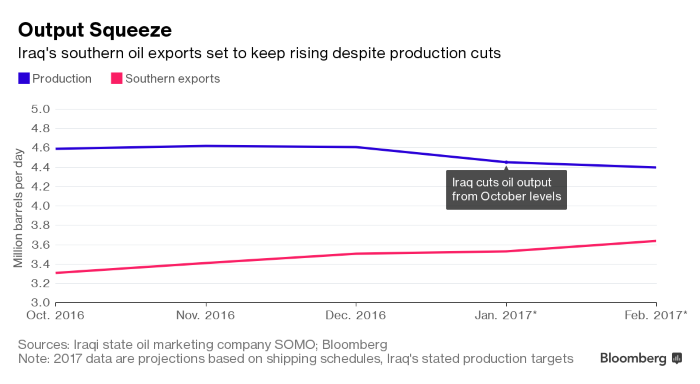Iraq Confirms Oil-Output Cut Even as Scheduled Exports Rise
Iraq has reduced its oil production by 160,000 barrels a day and will comply with cuts it agreed to make under an OPEC output deal, Oil Minister Jabbar Al-Luaibi said, even as ship loading data suggested that exports are set to increase next month.
The Persian Gulf producer is poised to ship 3.64 million barrels a day of crude oil in February from its ports in southern Basra province, according to a loading program obtained by Bloomberg, more than its December average of 3.51 million barrels a day, which itself was a record high. Iraq has pledged to reduce its production by 210,000 barrels a day from October levels, under a Nov. 30 agreement by the Organization of Petroleum Exporting Countries.
“If it’s really happening, it should soon be visible via lower exports” because Iraq has limited storage capacity, Giovanni Staunovo, a Zurich-based analyst at UBS Switzerland AG, said by phone. “Let’s see if it shows up.”

The rising exports from Basra have led some analysts and traders to question whether Iraq will comply fully with its promised contribution to the OPEC output cut. The group’s second-biggest producer was initially reluctant to accept a quota, asking first for an exemption to help it fight Islamic State militants and then disputing OPEC’s accounting before finally agreeing to the deal. The nation pumped 4.61 million barrels daily in December, data compiled by Bloomberg show.
Iraq is cutting production from fields operated directly by the federal government, Al-Luaibi said Tuesday by text message. The country’s government-operated fields produce around 440,000 barrels a day, or less than 10 percent of Iraq’s total output, Oil Ministry data from September show.
The remainder comes from fields operated by international companies, whose contracts entitle them to compensation if the government orders them to curtail production, and the semi-autonomous Kurdish region, whose government has not given any indication that it plans to contribute to the cuts.
Iraq expects to fully implement its pledged cut of 210,000 barrels a day by the end of January, Al-Luaibi said, without specifying areas or fields where it would make the additional decrease beyond the current reduction of 160,000 barrels a day. Phone calls to officials at the KRG’s Ministry of Natural Resources in Erbil were not answered.
Separately, Iraq’s Oil Ministry urged Angola’s state oil company Sonangol to resume work at two northern fields near Mosul by the end of February, the ministry said Tuesday in a statement. The company withdrew from the two fields, Najma and Qayyara, in 2014, under threat from Islamic State militants. The fields previously produced as much as a combined 30,000 barrels a day of crude.
Source: Bloomberg
HEADLINES
- Do shipping markets want Biden or Trump for the win?
- All 18 crew safe after fire on Japanese-owned tanker off Singapore
- Singapore launching $44m co-investment initiative for maritime tech start-ups
- Cosco debuts Global Shipping Industry Chain Cooperation Initiative
- US warns of more shipping sanctions
- China continues seaport consolidation as Dalian offer goes unconditional